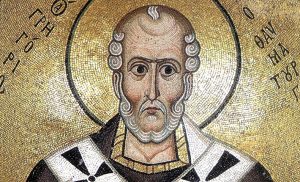 After his education, Gregory married and became a teacher of rhetoric. We do not know what happened to his wife, but the influence of his older brother Basil was strong enough to draw Gregory to monastic life. In 371, Basil arranged for his election as bishop of Nyssa, a town in Basil’s province. It was a political move intended by Basil to stem the influence of the Arians. Gregory was not happy with this sudden thrust into the fray, and he was not a very effective ally, and his brother criticized him for his lack of firmness. In the following decade he was deposed by the Arians, and later restored. His brother died, and Gregory came into his own. he was a prominent participant in the 2nd Ecumenical Council. He wrote scriptural commentaries and spoke of the concept of theosis, or deification as a luminous darkness, the ultimate paradox of union with God. His mystical theology is an early expression of the apophatic method which places more certainty in what we cannot say or know about divine truths. (NS)
After his education, Gregory married and became a teacher of rhetoric. We do not know what happened to his wife, but the influence of his older brother Basil was strong enough to draw Gregory to monastic life. In 371, Basil arranged for his election as bishop of Nyssa, a town in Basil’s province. It was a political move intended by Basil to stem the influence of the Arians. Gregory was not happy with this sudden thrust into the fray, and he was not a very effective ally, and his brother criticized him for his lack of firmness. In the following decade he was deposed by the Arians, and later restored. His brother died, and Gregory came into his own. he was a prominent participant in the 2nd Ecumenical Council. He wrote scriptural commentaries and spoke of the concept of theosis, or deification as a luminous darkness, the ultimate paradox of union with God. His mystical theology is an early expression of the apophatic method which places more certainty in what we cannot say or know about divine truths. (NS)